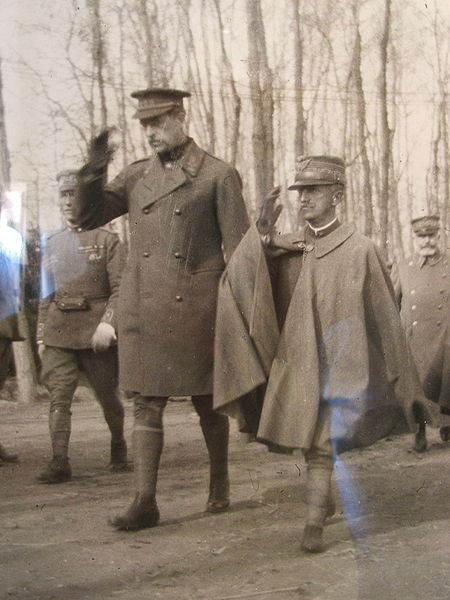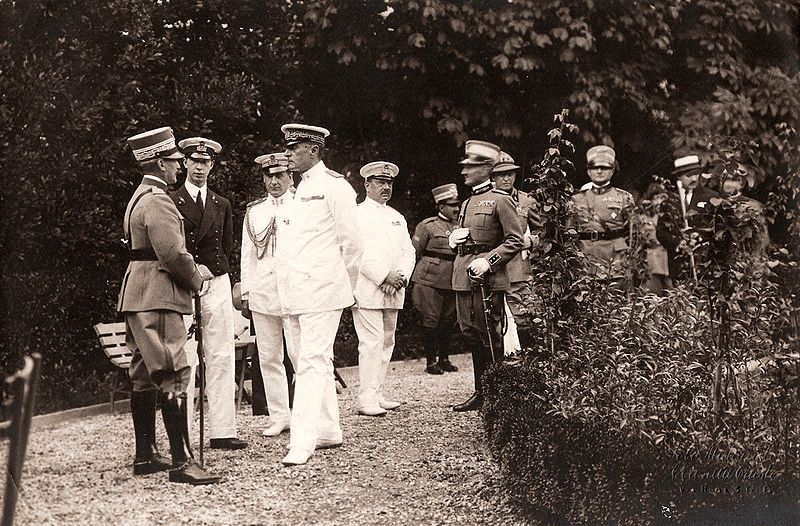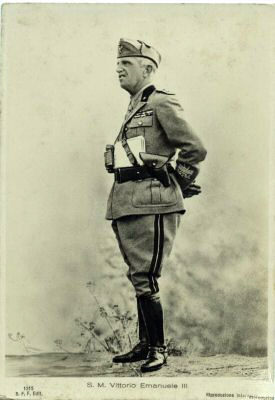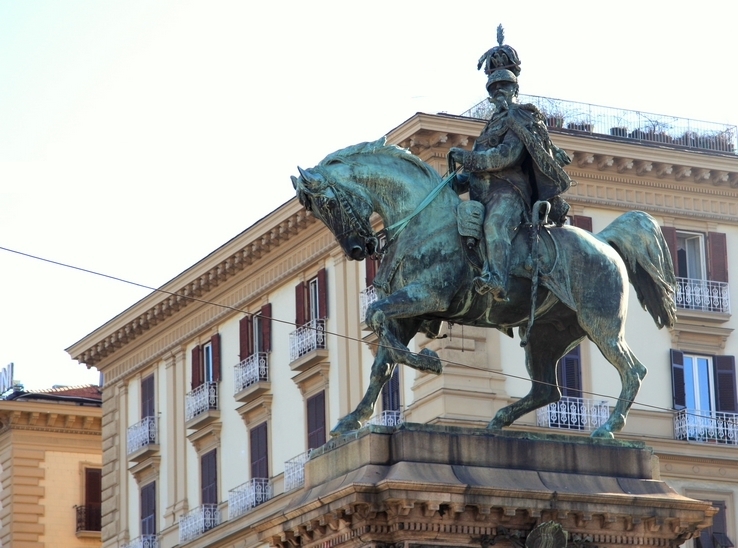<Back to Index>
- Physician Ephraim McDowell, 1771
- Novelist Fyodor Mikhaylovich Dostoyevsky, 1821
- King of Italy Victor Emmanuel III, 1869
PAGE SPONSOR
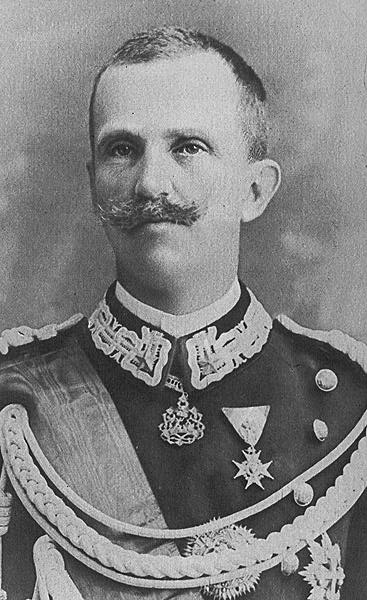
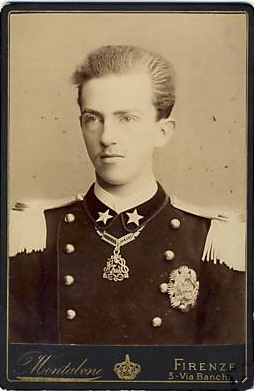
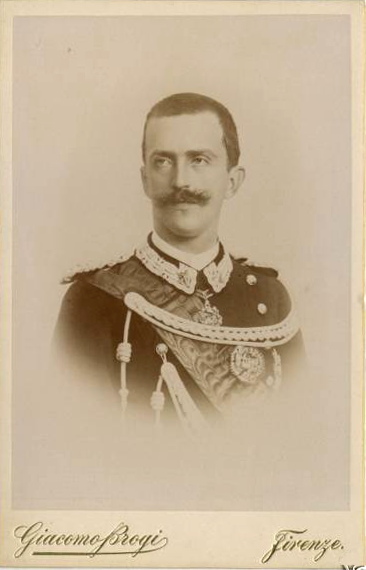
Victor Emmanuel III (11 November 1869, Naples, Campania – 28 December 1947) was a member of the House of Savoy and King of Italy (29 July 1900 – 9 May 1946). In addition, he claimed the crowns of Ethiopia and Albania and claimed the titles Emperor of Ethiopia (1936–41) and King of Albania (1939–43) which were unrecognised by the great powers in 1937 and 1939, respectively. During his long reign, Victor Emmanuel III saw two world wars and the birth, rise, and fall of Fascism in the Kingdom of Italy.
Victor Emmanuel was born in Naples, Italy. He was the only child of Umberto I, King of Italy, and his consort, Princess Margherita of Savoy. Margherita was the daughter of the duke of Genoa. Unlike his paternal first cousin's son, the 1.98 m (6 foot 6") tall Amedeo, 3rd Duke of Aosta,
Victor Emmanuel was short of stature even by 19th century standards, to
the point that today he would appear diminutive. He was just
1.53 m tall (just over 5 feet). On 24 October 1896, Prince Victor Emmanuel married Princess Elena of Montenegro.
On 29 July 1900, at the age of 30, Victor Emmanuel ascended the throne upon his father's assassination. The only advice that his father Umberto ever gave his heir was "Remember: to be a king, all you need to know is how to sign your name, read a newspaper, and mount a horse".
His early years showed evidence that, by the standards of the Savoy
monarchy, he was a man committed to constitutional government. Indeed,
even though his father was killed by an anarchist, the new King showed a commitment to constitutional freedoms. Though
Italy was a parliamentary democracy, the monarchy possessed
considerable residual powers, including the right to appoint the Prime Minister, even if the individual in question did not command majority support in the Chamber of Deputies.
A shy and somewhat withdrawn individual, the King hated the day-to-day
stresses of Italian politics, though the country's chronic political
instability forced him to intervene no less than ten times between 1900
and 1922 to solve parliamentary crises. When World War I began, Italy remained neutral at first, despite being part of the Triple Alliance (albeit it was signed on defensive terms and Italy objected that the Sarajevo assassination did
not qualify as aggression). However, in 1915, Italy signed several
secret treaties committing to enter the war on the side of the Triple Entente. Most of the people opposed war, however, and the Italian Chamber of Deputies forced Prime Minister Antonio Salandra to
resign. Victor Emmanuel, however, declined Salandra's resignation and
made the decision himself for Italy to enter the war. He legally had
the right to make this decision under the Statuto Albertino,
popular opposition to the war notwithstanding. However, the corrupt and
disorganised war effort, the stunning loss of life suffered by the
Italian army, especially at the great defeat of Caporetto,
and the economic depression that followed the war turned the King
against what he perceived as an inefficient political bourgeoisie.
Nevertheless, the king visited the various areas of northern Italy
suffering repeated strikes and mortar hits from elements of the Austrian/Italian fighting
there, where he demonstrated considerable courage and care in
personally visiting many people, with his wife the queen taking turns
with nurses in caring for Italy's wounded. It was at this time, the
period of World War I, that the king enjoyed genuine affection from the
majority of his people.
The economic depression which followed World War I gave
rise to much extremism among the sorely-tried working classes of Italy.
This caused the country as a whole to become politically unstable. Benito Mussolini, soon to be Italy's Fascist dictator, took advantage of this instability for his rise to power. In 1922, Mussolini led a force of his Fascist supporters on a March on Rome. Prime Minister Luigi Facta and his cabinet drafted a decree of martial law.
Vittorio Emanuele met the prime minister just after midnight and agreed
to sign the martial law agreement, he told the libral prime minister to
come back 9 am the same morning and he would sign it, however when the
prime minister returned at 9 am that morning the king had changed his mind
about signing martial law. The King suggested that his Royal Army (Regio Esercito)
could not have defended the city against the Fascist march. However,
testimony from the military leaders and surviving military records
challenge his claim. Fascist
violence had been growing in intensity throughout the summer and autumn
of 1922, climaxing with the rumours of a possible coup. Victor Emmanuel
had all the means at his disposal to sweep Mussolini and his rag-tag Blackshirt army to the side. General Pietro Badoglio told
the King that the military would be able to rout the rebels, who
numbered no more than 10,000 men, without any difficulty. Thereupon,
Victor Emmanuel could have ordered Facta to protect Rome and could have
supported a decree proclaiming martial law.
The troops were totally loyal to the King. Even Cesare Maria De Vecchi,
commander of the Blackshirts, and one of the organisers of the March on
Rome, told Mussolini that he would not act against the wishes of the
monarch. It was at this point that the Fascist leader considered
leaving Italy altogether. But then, in the minute before midnight, he
received a telegram from the King inviting him to Rome. By midday on 30
October, he had been appointed Prime Minister, at the age of 39, with
no previous experience of office, and with only 35 Fascist deputies in
the Chamber. The King failed to move against the Mussolini regime's abuses of power (including, as early as 1924, the assassination of Giacomo Matteotti and
other opposition MPs) and remained silent in 1926 when Mussolini
dropped all pretense of democracy. Later that year, Mussolini passed a
law declaring that he was responsible to the King, not Parliament.
Although constitutionally Italian governments were responsible only to
the monarch, it had been a strong constitutional convention since at
least the 1860s that they were responsible to Parliament. By 1928,
practically the only check on Mussolini's power was the king's right to
dismiss him from office — though that right could only be exercised on
the advice of the Fascist Grand Council, a body that could only be convened by Mussolini. Though
the King claimed in his memoirs that it was the fear of a civil war
that motivated his actions, it would seem that he received some
'alternative' advice, possibly from the archconservative Salandra as
well as General Armando Diaz, that it would be better to do a deal with Mussolini. Whatever
the circumstances, Vittorio Emanuele showed weakness in a position of
strength, with dire future consequences for Italy and for the monarchy
itself. It has been alleged that Victor Emmanuel's decisions showed not
only poor judgment but also undemocratic sentiments. What is not in
doubt is that Fascism offered political stability and opposition to left-wing radicalism.
This appealed to many people in Italy at the time, and certainly to the
King. In many ways, the events from 1922 to 1943 demonstrated that the
monarchy and the moneyed class, for different reasons, felt Mussolini
and his regime offered an option that, after years of political chaos,
was more appealing than what they perceived as the alternative: socialism and anarchism. Both the spectre of the Russian Revolution and the tragedies of World War I played large roles in these political decisions.
In 1929, Mussolini, on behalf of the king, signed the Lateran Treaty. The treaty was one of the three agreements made that year between the Kingdom of Italy and the Holy See. On 7 June 1929, the Lateran Treaty was ratified and the "Roman Question" was settled. The Italian monarchy enjoyed popular support for decades. Foreigners noted how even as late as the 1940s newsreel images of King Victor Emmanuel III and Queen Elena, born Princess Elena of Montenegro,
evoked applause, sometimes cheering, when played in cinemas, in
contrast to the hostile silence shown toward images of Fascist leaders. On 30 March 1938, the Italian Parliament established the rank of First Marshal of the Empire for Vittorio Emanuele and Mussolini. This new rank was the highest rank in the Italian military. As
popular as Victor Emmanuel was, several of his decisions proved fatal
to the monarchy. Among these decisions were his assumption of the crown
of Ethiopia,
his public silence when Mussolini's Fascist government issued its
notorious racial purity laws, and his assumption of the crown of Albania. In 1936, Victor Emmanuel assumed the crown of the Emperor of Ethiopia.
His decision to do this was not universally accepted. Victor Emmanuel
was only able to assume the crown after the Italian Royal Army invaded Ethiopia (Abyssinia) and had overthrown Emperor Haile Selassie during the Second Italo-Abyssinian War. The model for the Italian King thus becoming a King-Emperor was
evidently the British monarchs who since 1877 were King-Emperor (or
Queen-Empress) with a double throne, of Britain and India respectively. The League of Nations decried
Italy's participation in this war and the Italian claim on Ethiopia's
conquest was disputed by some members of the international community
(namely the United States and the Soviet Union) but accepted by Great Britain and France in 1938. It was undone in 1941 by the Ethiopian restoration after five years of Italian Empire. The term of the last acting Italian Viceroy of East Africa, including Eritrea and Somalia,
ended 27 November 1941 upon surrender to the allies. King Victor
Emmanuel III renounced his claimed titles of Emperor of Ethiopia in
November 1943, recognizing the previous holders of those titles as legitimate.
In 1938, Victor Emmanuel kept a public silence when the Fascist government, under pressure from Nazi Germany, issued racial purity laws. These laws left his Jewish subjects open to persecution and constituted a clear violation of both his coronation oath and his oath to the constitution. In 1939, Victor Emmanuel assumed the crown of the King of Albania. Italian forces invaded the nearly defenseless monarchy across the Adriatic Sea and caused King Zog I to flee. The Italian invasion of Albania was generally seen as the act of a stronger nation taking unfair advantage of a weaker neighbour. In 1941, while in Tirana, the monarch escaped an assassination attempt by the 19 year old Albanian patriot Vasil Laçi. Later, the author's act was considered by Communist Albania to
be a sign of the overall discontent of the oppressed Albanian population.
A second attempt by Dimitri Mikhaliov in Albania lead the Italians to
cast heavy doubts on the event by pointing to a possible Greek link following the monarch's green light to the Greco-Italian War. On 10 June 1940, Italian dictator Benito Mussolini made the fatal decision to have Italy enter World War II on the side of Nazi Germany. Italy was not prepared for war and, almost from the beginning, disaster followed disaster. In 1940 Italian armies in North Africa and in Greece suffered humiliating defeats. In late 1941, Italian East Africa was lost. In 1942, Italian Libya was lost. Early in 1943, the ten divisions of the "Italian Army in Russia" (Armata Italiana in Russia, or ARMIR) were crushed as an aside to the Battle of Stalingrad. Before the end of 1943, the last Italian forces in Tunisia had surrendered and Sicily fell. After a series of setbacks, the Royal Navy (Regia Marina) became no more than a "fleet in being." The Mediterranean Sea was hardly "Italy's Sea" (Mare Nostrum). The Royal Air Force (Regia Aeronautica), while generally doing better than the Army and the Navy, was chronically short of modern aircraft (its primary aircraft was a biplane in an age when jet engines were already being developed) and even it was politely uninvited to participate in the Battle of Britain. As Italy's fortunes worsened, the popularity of the King suffered. One coffee house ditty went as follows:
|
On 19 July 1943, Rome was bombed for the first time in its 2,500-year history, further cementing the Italian people's disillusionment with their once-popular King. On 24 July 1943, Count Dino Grandi and the Grand Council of Fascism voted overwhelmingly to ask Victor Emmanuel to resume his full constitutional powers — in effect, a motion of no confidence in Benito Mussolini.
The next afternoon, the King — who had been planning to get rid of the
dictator himself for some time — summoned Mussolini to the palace and
dismissed him as Prime Minister in favour of Marshal Pietro Badoglio.
He then ordered Mussolini arrested and renounced the usurped Ethiopian
and Albanian crowns in favor of the legitimate monarchs of those states. Publicly, Victor Emmanuel and Badoglio claimed that Italy would continue the war as a member of the Axis. Privately, they both began negotiating with the Allies for an armistice. Court circles had already been putting out feelers to the Allies before Mussolini's ousting. On 8 September 1943, Victor Emmanuel made something of a blunder when he announced an armistice with the Allies without first ordering the Royal Army to defend Rome. Left without orders, the
Italian armed forces everywhere disintegrated. Many of those units
which did not surrender, joined forces with the Germans. Italian forces
in Italy, France, the Balkans, and the Dodecanese Islands were quickly neutralized. Fearing a German advance on Rome, Victor Emmanuel and his government fled south to Brindisi.
This choice may have been necessary to protect his safety; indeed,
Hitler had planned to arrest him shortly after Mussolini's overthrow.
Nonetheless, it still came as a surprise to many observers inside and
outside Italy. They drew contrasts to King George VI and Queen Elizabeth, who refused to leave London during the Blitz, and of Pope Pius XII, who mixed with Rome's crowds and prayed with them after the working class Roman neighborhood of Quartiere San Lorenzo was bombed and destroyed. Ultimately, the Badoglio government in southern Italy raised the Italian Co-Belligerent Army (Esercito Cobelligerante del Sud), the Italian Co-Belligerent Air Force (Aviazione Cobelligerante Italiana), and the Italian Co-Belligerent Navy (Marina Cobelligerante del Sud). All three forces were loyal to the King. On 12 September, the Germans launched "Operation Oak" (Unternehmen Eiche) and rescued Mussolini. In short time, he established a new Fascist state in northern Italy. Mussolini's Italian Social Republic (Repubblica Sociale Italiana) was never more than a German-dominated puppet state, but it did compete for the allegiance of the Italian people with Badoglio's government in the south. Realizing
that he was too tainted by his earlier support of the Fascist regime,
Victor Emmanuel transferred most of his powers to his son, Crown Prince Umberto,
in April 1944. By doing this, Victor Emmanuel relinquished his
remaining power while retaining the royal title. This status was
formalized shortly after Rome was liberated on 4 June, when he
appointed Umberto Lieutenant General of the Realm. Within a year, public opinion forced a plebiscite to decide between retaining the monarchy or becoming a republic.
On 9 May 1946, in hopes of influencing the vote, Victor Emmanuel
formally abdicated. It did not work. 54% of the voters favored
declaring a republic in the referendum held less than a month later.
Widespread irregularities in the vote were alleged, but never proven,
and the Savoy family was required to leave the country. The Kingdom of Italy was no more. Taking refuge in Egypt, Vittorio Emanuele died in Alexandria in 1947 and was buried there, behind the altar of St Catherine's Cathedral. In 1948, Time magazine included an article about "The Little King".
He has been seldom treated sympathetically by historians. His almost forced abdication on the eve of a referendum on
the future of the Italian monarchy achieved nothing — being too little,
far too late. At worst, it reminded undecided voters of the role the
monarchy and the King's own actions (or inactions) had played during
the Fascist period, at precisely the moment when monarchists were
hoping that voters would focus on the positive impression created by Crown Prince Umberto and Princess Maria José as the de facto king
and queen of Italy since 1944. The 'May' King and Queen, Umberto and
Maria José, in their brief, month-long reign, were unable to
shift the burden of recent history and opinion. (Some present-day
historians have speculated that, had Victor Emmanuel abdicated in
favour of Umberto shortly after the Allied invasion of Sicily in 1943,
Umberto's relative popularity might have saved the monarchy.) To this
day, Victor Emmanuel's is criticized for his role in the rise of fascism, and support of Italian imperialism.
